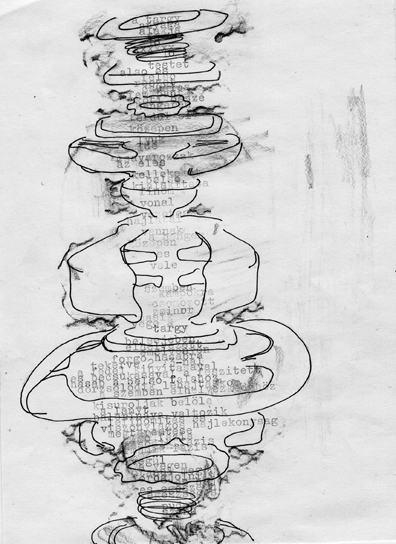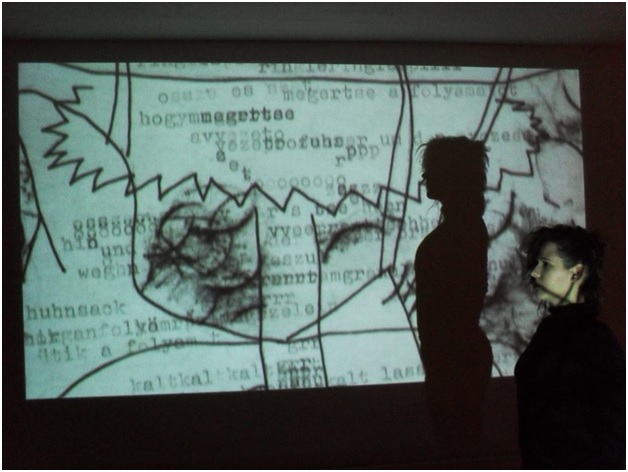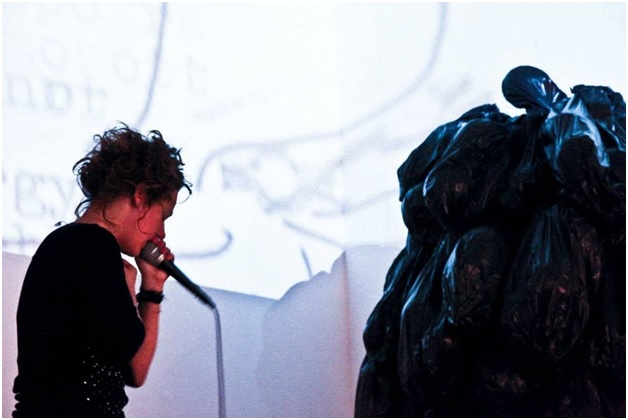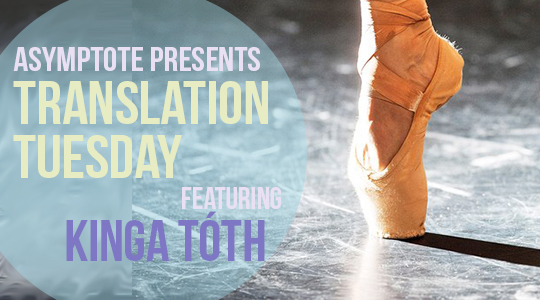“BALLERINA” is a poem from Hungarian writer Kinga Tóth’s book, ALL MACHINE. Tóth is not only a poet, but a visual and multimedia artist, some of whose visual work was featured in the Summer 2016 issue of Asymptote. The sound poetry Tóth produced for ALL MACHINE can serve as a fitting prelude (or accompaniment) to reading “BALLERINA.” We hear a whirring, disjointed medley of voices surrounded by the squeaking of an unoiled machine, much like the rotating figure in the music box of the poem.
Also included here are some illustrations from ALL MACHINE and photos from Tóth’s live work. Of them, Eva Heisler has written, “While the typed phrases in Tóth’s visual poems are a mix of English, German, and Hungarian, the poet insists that translation is not necessary, that legibility is not the point; words in her poem-drawings shake their signifying function and border on visual stammers, the line spacing often squeezed, the lines tightly stacked, and the pages factory-tuned.”

1
the object’s shape material
regular 10×10 wood
top and bottom parts
joined with metal hinges
rotating a cylinder
in the centre a hole where
sharp fixings
are screwed
its internal design
delicately lineated
including curves
in the centre of the cylinder
(and opposite too)
is wire knotted
to hooks inside the object
the other end
positioned on a platform
onto a turning rod
wound to 2/3
with the opening and
closing of the lid the taut
rod scrapes against
the object’s inner wall/border
upon lowering against
the opposite the aim
of the first phase is to scour
the girl out from within
2
the cylinder
in the centre on hooks
in the hole is the wire
the wire coiled
around the girl
like a lace collar
bricklayer’s line
the girl a buttress
on her the wire calm
or tautening multiple winding
equally multiple RPM
the shape alters the position
due to the begun rotation
of the platform over and over
the box opens and closes
slackening gasping for air
the girl pink like
victims
in the second phase
she becomes a ballerina

3
the third phase
the finishing touches and
creating relative flexibility the lock
on this step now serves
a function with the turning
of the key on the two
still unmarked sides
parallel pieces of twine
rise outwards the choice
of thread for the
detail in the skirt
/tutu and pair of tights
is crucial if excessively
strong it cuts into the
human parts a mishmash
of assorted pins and
hooks a network of leftover
threads from the first phase
interconnects each one
4
lastly the figure
learns to bend over
in line with the lock from
a cassette concealed inside until
now a rectangular moulder
penetrates the waist section
thanks to the workmanship
it pushes and tips her over but
doesn’t break her figure
it adds to her external character
the internal spins and bends
and healthy talc-white

Translated from the Hungarian by Owen Good
Kinga Tóth, born in Hungary, based in Berlin, writes and publishes poetry and prose in Hungarian, German, and English. She is also a singer-performer-illustrator of visual and sound poetry, and the frontwoman of the Tóth Kinga Hegyfalu project. Her poems are deformed and diseased mechanical bodies of text. Tóth has been published in Asymptote and POETRY. Her debut prose work in Hungarian, The Moonlight Faces (Magvető, 2017), received the Hungarian Hazai Attila award for experimental literature. She also has two collections of poetry: Party (PRAE, 2013) and All Machine (Magvető, 2014). All Machine has been published in German translation as Allmaschine (Akademie Schloss Solitude, 2014). Other German publications include Wir bauen eine Stadt (Parasitenpresse, 2016) and Textbilder (Gedok, 2016). Tóth regularly writes in German and in English, and in autumn 2017 was granted membership for International Writing Program in Iowa.
Owen Good, born in the North of Ireland, is a translator of Hungarian literature. Good studied Hungarian language and literature at the School of Slavonic and Eastern European Studies in London before moving to Budapest in 2011. Besides translating Good teaches at Péter Pázmány Catholic University, and is an editor of Hungarian Literature Online. Good has published in Asymptote (winner of the Close Approximations 2014), Hungarian Review, Hungarian Quarterly, Hungarian Literature Online, and Dalkey Archive Press’s Best of European Fiction 2016. He has worked with several writers, including Krisztina Tóth, Ferenc Barnás, György Petri, and Réka Mán-Várhegyi. For Seagull Books he is currently translating a collection of short stories by Transylvanian author Zsolt Láng (expected 2019), and the novel Pixel by Krisztina Tóth (expected autumn 2018).
*****
Read more translations from the Asymptote blog:

